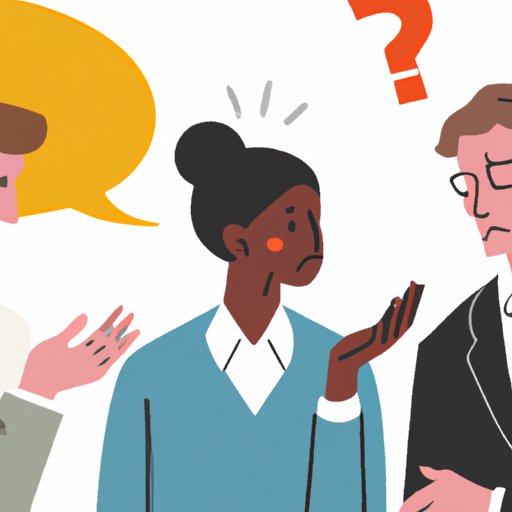
Introduction
Have you ever found yourself in a conversation where you are not sure if the other person truly understands what you are saying? Maybe you ask, “Do you know what I mean?” only to receive a vague response. This is a common communication problem that can occur in both personal and professional settings. The purpose of this article is to explore this issue and provide tips for overcoming it, allowing you to have effective conversations and avoid misunderstandings.
The Importance of Understanding Communication: Do You Know What I Mean?
Effective communication is vital in our daily lives. Whether it’s in our personal relationships or at work, communication is the foundation of every successful interaction. When we communicate well, we share our thoughts and ideas in a clear and concise manner, and we understand each other’s ideas and needs. This helps us build trust and foster healthy relationships.
However, when communication is ineffective, misunderstandings can occur, leading to negative consequences such as mistrust, wasted time, and conflict. This is where “Do you know what I mean?” comes into play.
Misunderstandings in Communication: Do You Really Know What I Mean?
Misunderstandings in communication can occur for various reasons. For example, cultural differences, prejudice, poor listening skills, and language barriers can all prevent effective communication.
Another common barrier is assuming that we already know what someone is trying to say. This can lead to misinterpretation and misunderstanding, where the intended message and the received message are not the same.
For instance, imagine that a colleague asks you to “hold down the fort” while they step out. You assume that they want you to stay in the office and keep an eye on things. However, when they return, they are upset because they wanted you to make some calls that were essential for the project they were working on. This miscommunication could have been avoided if you had taken the time to clarify what they meant by “hold down the fort.”
Breaking Down Communication Barriers: How to Ensure “Do You Know What I Mean?” is a Thing of the Past
To overcome communication barriers, we need to practice effective communication strategies. Here are some practical tips for improving your communication skills and eliminating misunderstandings:
Strategies for Overcoming Common Communication Barriers:
- Be aware of cultural differences and respect them.
- Avoid jumping to conclusions or making assumptions.
- Be clear and concise in your language.
- Use visual aids or examples to make your point.
Tips for Active Listening:
- Pay attention to the speaker’s body language and tone of voice.
- Ask questions to clarify the message.
- Paraphrase what the speaker said in your own words.
- Avoid interrupting or finishing the speaker’s sentences.
Importance of Clarifying Misunderstandings:
When you are uncertain about something or you don’t understand what the speaker means, it’s essential to ask for clarification. Don’t be afraid to say, “Do you know what I mean?” or “Can you explain that further?”. This shows that you are interested in what the person is saying and want to understand their perspective.
Mastering the Art of Communication: The Power of Asking “Do You Know What I Mean?”
Asking for clarification is an essential communication skill that we should all master. When you ask, “Do you know what I mean?” you acknowledge the possibility of misunderstandings and show that you care about having an effective conversation.
Tips for Asking “Do You Know What I Mean?”:
- Be polite and respectful.
- Use a friendly tone of voice.
- Ask the question sincerely, not as a rhetorical question.
Benefits of Using This Phrase in Communication:
By asking “Do you know what I mean?” you can:
- Eliminate confusion and clarify your point.
- Ensure productive communication.
- Demonstrate your interest in the conversation.
The Impact of Miscommunication: What Happens When Someone Doesn’t Know What You Mean?
The consequences of miscommunication can be serious and can lead to conflicts, mistrust, and even personal or professional failure. Here are some examples of miscommunication in different settings:
- In personal relationships, miscommunication can lead to hurt feelings, misunderstandings, and arguments.
- In the workplace, it can lead to wasted time, lowered productivity, and conflict among co-workers.
Importance of Effective Communication in Avoiding These Consequences:
Effective communication skills are essential to avoid the negative impacts of miscommunication. By listening actively, clarifying misunderstandings, and avoiding assumptions, we can communicate more clearly, fostering healthy and productive relationships.
Conclusion
In conclusion, effective communication is essential in every aspect of our lives. Miscommunication can lead to negative consequences, but by practicing active listening, clarifying misunderstandings, and asking for clarification, we can ensure that our conversations are productive. Let’s all strive to master the art of communication and use “Do you know what I mean?” to eliminate any misunderstandings that may occur.
Remember, when we communicate effectively, we can build healthy and productive relationships both at home and at work, facilitating trust, collaboration, and success.
Call to Action:
Next time you’re in a conversation, try to implement some of the strategies and tips provided here. Ask questions, listen actively, and clarify misunderstandings.




